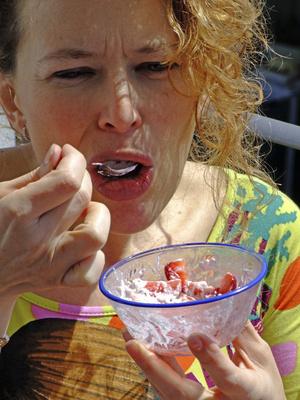Eating a healthy diet becomes especially important during pregnancy because not only is the mother’s health impacted by her diet, but the baby’s well-being is affected as well. Eating better doesn’t mean eating a lot more, either. An additional 300 calories a day for a total of about 2500 calories is all that is required.
Healthy Food
Healthy, organic food including dark, leafy vegetables, fresh fruits, meat and whole grains that don’t have extra salt or sugar are best for the baby. You should try to avoid highly processed foods and snacks whenever possible.
Protein Is Important
Eating three daily servings of protein rich foods such as beans, meat, chicken, certain fish and tofu will give you an adequate amount of protein. The protein will help you maintain your energy level and simultaneously help the development of your baby. Everything you eat is also feeding your baby.
Calcium-Rich Foods
Three servings of calcium-rich foods a day, the equivalent of 1200 mg of calcium daily, will help the healthy development of your baby’s bones. Calcium-rich foods include dark, leafy vegetables, milk, cheese, yogurt and other dairy products, as well as fortified juice and cereals.
Vitamin-Mineral Supplement
A vitamin-mineral supplement will assure that both mom and baby receive all the necessary nutrients for prenatal health. The supplement should contain 400 to 800 micrograms of folic acid and 30 micrograms of iron. The folic acid is added to a prenatal diet because a lack of it has been associated with birth defects such as spina bifida.
Dieting and Weight Gain
Women who become pregnant at a normal weight should gain anywhere between 25 and 35 pounds with the greatest number of pounds added in the third trimester, when the fetus is rapidly growing. Dieting during pregnancy can be unhealthy for the baby, as the baby requires adequate nutrition to grow. Several small meals a day, every four hours or so, totaling five or six small meals instead of three larger ones may be easier than consuming more food less frequently. Small meals can help prevent heartburn and improve digestion.
Things to Avoid
Junk food, because of the processing, contains chemicals and are a source of empty calories. Seafood, unpasteurized milk and raw meat can be sources of harmful bacteria. Some fish contain methyl mercury, which can put the fetus at risk. The Food and Drug Administration recommends limiting the consumption of cooked fish to about two servings weekly. Alcohol should be avoided because there is risk of harm to the baby.
Photo Credit
- woman eating outdoor image by citylights from Fotolia.com





